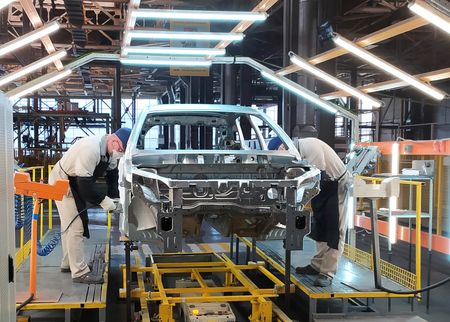 1
1 1
1

(Reuters) -International companies with exposure to Russia are preparing for the West to impose fresh sanctions on the country after an escalation in the Ukraine crisis.
Below are comments from companies:
NESTLE, FOOD GROUP WITH FACTORIES IN RUSSIA
“We are closely monitoring the situation and have business continuity plans in place that can be activated as needed. The safety and protection of our employees remains our highest priority. We will not speculate on any potential sanctions,” a Nestle spokesperson said.
As of 2020, the company had six factories in Russia, including plants making confectionary and drinks. Its 2020 sales from Russia were worth about $1.7 billion.
METRO, GERMAN RETAILER WITH RUSSIAN OPERATIONS
“We are following the current developments in the conflict over Ukraine with concern. We continue to rely on diplomatic efforts from all sides to avert further escalation. Our responsibility as a company in Russia lies primarily with our approximately 10,000 employees and 2.5 million customers,” Metro spokesman Gerd Koslowski said, adding that the same concerns applied for Metro in Ukraine.
HEIDELBERGCEMENT, GERMAN COMPANY WITH THREE PLANTS IN RUSSIA
“We do not expect any major impact on our Russian business should the conflict escalate further. All of our three Russian cement plants supply their respective local/regional markets and do not export outside Russia,” Heidelberg spokesman Christoph Beumelburg said, adding that the company had sold its Ukraine operations in 2019.
NOKIAN TYRES, WHICH HAS A PLANT AND WAREHOUSE IN RUSSIA
“We prepare for different scenarios as part of our normal risk-management work, and now we have intensified the work due to the current geopolitical situation, including availability planning,” said Nokian spokeswoman Tarja Pennanen.
She said Nokian was prepared to transfer certain product groups between factories if the situation required.
RENAULT, WHICH HAS RUSSIAN JOINT VENTURE AVTOVAZ
Russian carmaker Avtovaz, controlled by France’s Renault, is seeking alternative supplies of electronic chips in case U.S. sanctions curb deliveries, Avtovaz Chief Executive Nicolas Maure said, without indicating how Avtovaz secures chips for its car plants in Russia.
“We are following the ongoing diplomatic discussions very carefully. At this stage, it is premature to estimate what could be the sanctions,” said Renault spokesperson Rie Yamane.
COCA-COLA HBC, LONDON-LISTED BOTTLER WITH RUSSIAN OPERATIONS
“We have contingencies in place for all scenarios, including alternative sourcing, so that we can act swiftly to whatever happens,” Zoran Bogdanovic, chief executive of Coca-Cola HBC, told Reuters.
He said the soft drinks company, which operates in 29 European and African countries and counts Russia and Nigeria as its two biggest markets, had learned lessons from its experience during the 2014 Russian-Ukrainian conflict.
“We ensure that we have the right level of stocks in our markets to avoid disruptions,” the CEO said.
DANONE, WHICH ACHIEVES 6% OF ITS SALES IN RUSSIA
“Danone is monitoring the situation. Our local teams are monitoring the situation very closely with a view to ensure the security of employees,” a Danone spokesperson said.
The French company is the world’s largest yoghurt company and controls Russian dairy brand Prostokvashino. It mainly produces dairy products in Russia.
BASF, GERMAN CHEMICALS MAKER
“We are monitoring the situation in Ukraine very closely. The safety of our employees has the utmost priority. All employees in Ukraine are requested to work from home where possible and to avoid business travel. All of our employees in Russia continue to work as normal,” BASF said in a statement.
In 2021 Russia accounted for 1% of BASF’s total sales. Ukraine accounted for 0.2%.
NESTE, FINNISH REFINER AND BUYER OF RUSSIAN OIL
“If sanctions are aimed at Russian crude oil and oil products, it will have an impact on the oil market globally. It is very difficult to define those impacts at this stage,” Sami Oja, interim leader of the oil products business at Neste, told Reuters. “If there were no Russian oil available, Neste would buy its crude oil in other markets.”
The company relies on Russia for two thirds of its oil needs.
“A significant part of Neste’s crude oil purchases are made on so-called spot markets, meaning one load at a time, and therefore we are able to react flexibly to changes in the markets in our purchases if necessary,” he said.
“We are following the situation and we prepare for possible impacts with different risk-management measures.”
(Reporting by Reuters correspondentsCompiled by Edmund BlairEditing by Carmel Crimmins, Gareth Jones and David Goodman)